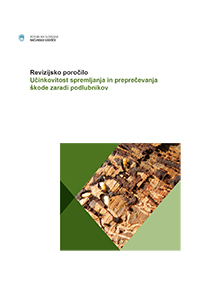The Republic of Slovenia is one of the most forested countries in Europe - forests cover more than 58% of its surface area. Management of forests is not only in the interest of the owners (three quarters of forests are private), but also in the public interest, therefore it is important that the state regulates this field efficiently.
In the past years, bark beetles (small insects that reproduce in the inner bark of spruce trees) have been proliferating wildly. Damage caused by these insects in the period from 2014 to 2020 is estimated to EUR 394 million. Climate changes affect the intensity of their proliferation as well as planting of certain tree species in the past (a deviation from the natural condition, due to economic reasons).
The audit revealed the following:
Most of bark beetle outbreaks are detected by Forest Service, which orders owners of the forests to remove and destroy infested trees. 53.8% of orders issued to forest owners were not implemented within the deadline. And only for 11.1% of not implemented orders were later demanded enforcement procedures by Forest Service. Ministry has developed indicators for assessing the performance of Forest Service in combating bark beetles. During the audit, Forest Service adopted new internal guidelines to increase its efficiency in monitoring and preventing damage caused by bark beetles.
Due to forest management in the past, the area covered by spruce trees in Slovenia is almost four times larger than it would be without human interference. Forest Service plans to reduce the proportion of spruce seedlings in overall planting needs proposal in order to bring forests closer to their original, natural state. However, it is not yet clear which tree species shall be used instead of spruce trees since a consensus on the matter has not yet been reached.
Forests are managed by forest owners, guided by forest management plans developed by Forest Service. During the audit, it was not quite clear which works planned in the forest management plans can be defined as primarily in the public interest and can be therefore enforced by Forest Service. Since 2012, public funding of works planned in the forest management plans has decreased by more than a half, thus causing negative impact on the amount of work carried out in the forests by forest owners. Forest management plans are therefore implemented in smaller proportion as before, which according to SAI Slovenia, has led to higher risk of bark beetles outbreaks.
In order to improve efficiency in monitoring and preventing the damage caused by bark beetles Forestry Institute is developing methods of remote detection of bark beetle outbreaks and simulation models for prediction of bark beetles outbreaks.
Despite significant efforts, auditees have been only partially efficient in monitoring and preventing the damage caused by bark beetles. SAI Slovenia gave several recommendations to the auditees.


